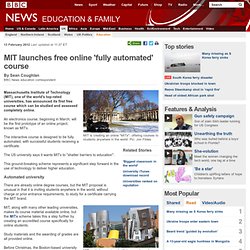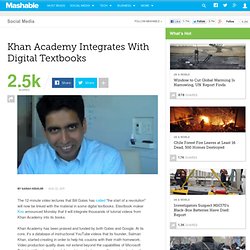

Hurdles Remain Before College Classrooms Go Completely Digital. 5 Places to Get Digital Textbooks Mashable 5 Places to Get Digital Textbooks. The 'Undue Weight' of Truth on Wikipedia - The Chronicle Review. MIT launches free online 'fully automated' course. 13 February 2012Last updated at 11:37 ET By Sean Coughlan BBC News education correspondent MIT is creating an online "MITx", offering courses to students anywhere in the world.

Pic: Jon Fildes Massachusetts Institute of Technology (MIT), one of the world's top-rated universities, has announced its first free course which can be studied and assessed completely online. An electronics course, beginning in March, will be the first prototype of an online project, known as MITx. The interactive course is designed to be fully automated, with successful students receiving a certificate. The US university says it wants MITx to "shatter barriers to education". Udemy Puts Ivy-League Profs on Your Desktop for Free. Want to learn about the history of modern China from a professor who has taught at Dartmouth since 1985?

Until Thursday, your best bet was probably to cough up some serious SAT scores and even more serious tuition. Now Udemy is giving you access to an online courses by professors with such qualifications — for free. The startup online learning platform launched a new site called "The Faculty Project" Thursday that offers free course content from professors. The site's first 15 courses include teachers from Stanford, Yale, Northwestern and Dartmouth. When users enroll for a course on Thursday, they'll be emailed when the professor adds new lessons to it. Professors use the same course creation tool Udemy offers on its main site to create the courses. Pearson and Knewton Team Up to Make Learning Personal.
Pearson-backed Startup Aims to Be the Zynga for Learning. What if the 232 million people who log into Zynga's Facebook games each month instead spent hours working through online learning resources?

Connections Education: The rise of an education tech startup. The Baltimore-Washington corridor is an economic powerhouse in many areas -- federal contracting, anyone?

-- but it may soon become known as the nexus of another, growing industry: online education. The $400 million purchase of a local education technology startup by a British company this fall is the latest sign that the region is successfully producing firms that develop cutting-edge technologies for schools or seek to transform them entirely. Online Degrees From MIT. Khan Academy Integrates With Digital Textbooks. The 12-minute video lectures that Bill Gates has called "the start of a revolution" will now be linked with the material in some digital textbooks.

Etextbook maker Kno announced Monday that it will integrate thousands of tutorial videos from Khan Academy into its books. Khan Academy has been praised and funded by both Gates and Google. At its core, it's a database of instructional YouTube videos that its founder, Salman Khan, started creating in order to help his cousins with their math homework. Khan Academy Blends Its YouTube Approach With Classrooms. Virtual schools are multiplying, but some question their educational value. Conceived as a way to teach a small segment of the home-schooled and others who need flexible schooling, virtual education has evolved into an alternative to traditional public schools for an increasingly wide range of students — high achievers, strugglers, dropouts, teenage parents and victims of bullying among them.

“For many kids, the local school doesn’t work,” said Ronald J. Packard, chief executive and founder of K12. Exclusive: What Electronic Textbook Provider Has The Biggest Library? [STUDY] Just about every electronic textbook company declares that it has the most books available for download. Coursesmart calls itself “the world’s largest digital course materials provider.” Sellers like Barnes & Noble and Amazon return absurdly high numbers for searches in their etextbooks sections that include novels and other general books used in classes. JSTOR opens limited free access option for non-subscribing scholars. For a subscription-based content vault like JSTOR, the economy of the modern Web is a double-edged sword.

On one side, you have open-culture hacktivists like Aaron Swartz trying to spring your paywalled content by allegedly sneaking into a wiring closet at the Massachusetts Institute of Technology and downloading 4.8 million documents from your online archive. This edge can cut against you — as it did in July, when Swartz’s caper framed the open-access debate (fairly or not) in terms of Swartz, the geek-hero, versus JSTOR, the Scrooge. On the other side, you have universal Web search engines sending droves of unlikely visitors to your content. They might not be paying the toll to get in, but the fact that they found their way to the door means your potential clientele is larger, and closer at hand, than you had imagined. Making You More Awesome: The Red-Hot World of Online Learning Services.
The joy of learning is among the most valuable ways to find meaning in life.

Combine that with the substantial imbalance between supply and demand of skilled labor in the United States, and a period of economic upheaval, and you've got a recipe for for something magical to happen. While traditional schools struggle to fit the bill, the internet is finally rising the the occasion. Startups like Treehouse, CodeAcademy, Lynda.com and of course Khan Academy are capturing the imagination of learners around the world, of all ages.
Can these sites give traditional education the "Wikipedia vs. the encyclopedia" treatment? Why are these new websites aimed at teaching new skills so hot right now? Human Capital Management is Hot.